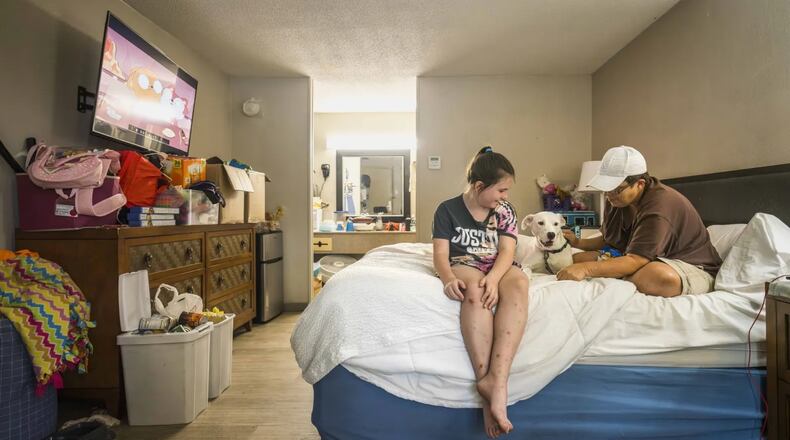This story was originally published by The Current GA.
Off Interstate 95, behind one of the doors of the string of two-story motels, Melissa Bullard, her daughter Heaven and their dog Ivory live on the fringes of society. Piled into one room, sleeping in the same bed, their family shares the same struggle of many of Glynn County residents: housing insecurity.
In Glynn County, there are no shelters specifically for single mothers and their children, or many others. The lack of services and affordable housing has been an urgent policy topic for years in Brunswick and the county, a gap that private donors, charities and religious organizations are trying to fill amidst pushback from local officials.
Last month, community philanthropists announced a $10 million fund to build and sustain housing for Glynn County residents experiencing homelessness, or like Melissa, who’s ability to keep a roof over her and her daughter’s head changes week to week. County officials put off a vote on on June 18 to approve zoning changes that would enable a night shelter for local men with jobs.
Amid the bickering and delays, Melissa hit a financial cliff. On Aug. 31, she wouldn’t be able to afford her cramped room at the Days Inn.
That meant an existential decision: a voluntary separation with 10-year-old Heaven so that both of them could have a safe place to sleep, or stay together on the streets. Locally, there are shelters available for women and children individually, but no option for them to stay together.
Credit: Justin Taylor/The Current GA
Credit: Justin Taylor/The Current GA
Surrounded by her belongings which she had stuffed into trash bags, expecting to have to move, and a tabletop full of medicine, Melissa spoke with agony about being alone and out of options.
“I have nobody to help me, I’m supposed to have a friend but people don’t keep their word, and I can’t get mad at them, you know? I mean, I am mad, but like, I can’t say anything, and like I can’t force them to come help me. I don’t have a family to count on. I don’t have a support system, and that’s why, you know, I’m a lot to handle,” she said.
Behind her, Heaven and Ivory snuggle in bed. Melissa, meanwhile, smokes Marlboros, which give her a sense of solace while balancing on the knife edge of housing instability.
Finding a space to call home
Melissa relocated to Glynn County decades ago from Fernandina Beach, an oceanside town 35 miles north of Jacksonville. Growing up, Melissa moved around often. Her mother battled cancer multiple times, and while she tried her best, housing and life were always a struggle, she says.
“I’ve been poor my whole life and I’m probably going to die poor,” said Melissa.
At 17, Melissa left home, got on a bus to her aunt’s house in Pennsylvania, hoping to experience more in life.
“I wanted to be on my own, and now, as I look back at it, it was a stupid decision,” lamented Melissa. “I was always mad because my momma grew up very poor, and I always wanted better. Now that I look back, I’m like my mom was sick, and I was working and making good money at the time, and I thought I had it, and I was good to go.”
Melissa spent years without settling down, moving back and forth out of the Jacksonville area. In 2013, she learned she was pregnant with twins. Heaven, and the second baby, also a girl, died at three-months-old of sudden infant death syndrome.
Melissa’s grief is still acute when she describes buying them white frilly dresses from Target, outfits for baby photos that she could treasure. Instead, she ended up burying Nevaeh in hers.
Melissa and Heaven moved on, still in search of a better life. Glynn County had become a familiar place, one that drew her back again and again. After spending a couple of years in Minnesota, she decided to return with Heaven at the beginning of the pandemic.
For a while, they lived in her RV, spending the nights in empty parking lots in town. But later, they moved to the mobile home park off of 111 Carter Drive. The landlord allowed Melissa to settle in with no money upfront and pay off her balance over time. Costs came up to $350 a month plus the electricity and running water and $400 for payment on the RV.
For a while, she had finances under control, and they could make ends meet from Melissa’s $18,000 annual income, which comes primarily from Social Security payments due to disability. Melissa has spinal damage, and takes medicine for panic attacks and seizures. Plus, she can’t afford child care.
Heaven, who has been diagnosed with Asperger’s Syndrome and developmental issues, first was enrolled in Sterling Elementary School, and then switched to Satilla Marsh Elementary in October 2023, where she was on an individualized education plan. However, due to persistent bullying, Melissa decided to withdraw her child from school.
Credit: Justin Taylor/The Current GA
Credit: Justin Taylor/The Current GA
By summer, life threw Melissa more curveballs.
The single mother had succeeded in finding work as an Uber driver. At first, it was an answer to her prayers. Melissa could earn extra money on her own schedule. Soon she was making more money in one week than her monthly support check, especially when she would accept rides from Brunswick to St. Simons Island.
On July 16, she picked up three patrons, all of whom had been drinking and needed a ride home at night on the island. She dropped two off first, and then finished the fare with the remaining passenger insisting on riding in the front seat with her.
According to Melissa, the ride quickly became uncomfortable. The man started disclosing personal details about his marriage and then soliciting sex from her. He grabbed her breasts and when she stopped at his house he tried to force himself on her, she said.
The fear was overwhelming and the only way to escape was to invoke the image of her daughter. She told the man she had to get home to her sleeping child.
“I was trying to lie and do anything to get him out of my car because I was like, if I hit him, you know, I’m going to go to jail. Nobody’s gonna be there to take care of my daughter. And you know, people are gonna side with him, and like they’re doing now, that’s how I feel like this county is siding with him,” Melissa said.
Shellshocked, Melissa returned to the motor home park, but she decided not to be a victim. The next day, she went to the Southeast Georgia Health System for an exam, where the nurse advised her to call a patient advocate to connect to a therapy service. Melissa then filed a police report. The Glynn County Police Department confirmed to The Current GA that there is an active investigation into the incident.
Melissa, however, remains too frightened to continue driving.
Shrinking space, options
By August, Melissa slipped off the edge she had been balancing so well, tipping from being house stable to housing insecurity.
Summer rains caused a tree limb to fall on her RV, damaging the vehicle. The roof leaks became unbearable, but she had no money for repairs. Or for rent.
On Aug. 10, she was told she was being evicted from the motor home park in two days’ time and ordered to leave the premises.
On Aug. 13, she sold her RV for $3,000 and used the money for the initial move to the Days Inn. She purchased a 2004 GMC Yukon on Facebook Marketplace on Aug 16, thinking it would only need a water pump. However, it turned out that the transmission also needed work, which she couldn’t afford, especially considering the additional cost of car insurance.
She was able to get $600 for the Yukon after reselling it, which she used for food for Heaven, their dog and bills.
The last of the money was used on an Uber to travel to see her psychiatrist.
If that wasn’t enough, the Georgia Department of Human Services Division of Family & Children Services (DFCS) contacted Melissa about a complaint made against her but shortly afterward DFCS closed the file due to a lack of evidence.
By the end of August, though, Melissa was facing the existential problem of many of Glynn County’s working poor. To keep her daughter secure and safe, and keep a roof over both of their heads, she might have to give Heaven over to the state.
DFCS, however, offered her enough money to pay another week for her $70 per night hotel room so she and her daughter could stay together.
Melissa spent those days scrambling for another short-term fix for her housing situation.
She pawned some power tools and other household items to collect another night of lodging.
Then she turned to Facebook, where the generosity of strangers brought her enough funds to remain at the hotel until Sept. 9.
“It helps me now but it’s not a solution because I’m still going to be behind. It’s hard to play catch up,” said Melissa.
Credit: Justin Taylor/The Current GA
Credit: Justin Taylor/The Current GA
The Current GA then introduced Melissa to Alan Akridge, the senior rector at downtown Brunswick’s St. Mark’s Episcopal Church.
Rev. Akridge wears many hats in the community, and has been instrumental in building the $10 million fund through Coastal Georgia Community Foundation that aims to solve housing challenges for veterans, mothers with children and men striving to restore their full participation in the broader community.
The pastor said that up to 20% of the calls and visits to his church are from people seeking immediate assistance due to potential housing insecurity.
Based on his experiences in the ministry in Brunswick and a small town in Western North Carolina, he noted that a common underlying issue for these individuals is a lack of support systems, whether friends or family networks or their own church families.
“It seems to me that more and more individuals and more and more families with young children don’t have those networks,” he said. “Not only are they missing one of those, but they’re missing all three of those, so they don’t have any support system. If the car breaks down, they don’t have any support system. If they lose the job, they don’t have any. And so the only option for them is that they end up on the street.”
Rev. Akridge explained that the key to finding solutions begins within the community. That’s what the Under One Roof collective wants to do, he said.
“It’s real simple. It’s this. Everybody can do something. I believe the reason Under One Roof was established is because in the short term, in the mid term, and in the long term, if we are not helpless there, we are surrounded by opportunities. They might not be big ones, and we don’t have to solve all the problems, but we can help in some way.”
Credit: The Current GA
Credit: The Current GA
MEET OUR PARTNER
This story comes from our partner The Current GA, an inclusive nonprofit, independent news organization which provides in-depth watchdog journalism for Savannah and Coastal Georgia’s communities. Sign up for their newsletter here.
If you have any feedback or questions about our partnerships, you can contact Senior Manager of Partnerships Nicole Williams via email at nicole.williams@ajc.com.
About the Author









